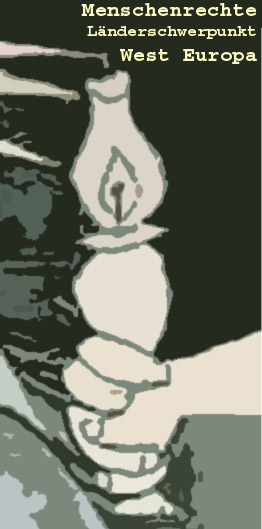Monday, June 04, 2007
Zur Lage in Palästina
4 June 2007
[bold added by Blog editor]
Israel/OPT: Forty years of occupation --
no security without basic rights
A 45-page report published today, Enduring Occupation: Palestinian under siege in the West Bank, illustrates the devastating impact of four decades of Israeli military occupation. The report documents the relentless expansion of unlawful settlements on occupied land that deprives the Palestinian population of crucial resources and documents a plethora of measures that confine Palestinians to fragmented enclaves and hinder their access to work, health and education facilities. These measures include a 700km fence/wall, more than 500 checkpoints and blockades, and a complicated system of permits.
"Palestinians living in the West Bank are blocked at every turn. This is not simply an inconvenience -- it can be a matter of life or death. It is unacceptable that women in labour, sick children, or victims of accidents on their way to hospital should be forced to take long detours and face delays which can cost them their lives," said Malcolm Smart, Director for Amnesty International's Middle East and North Africa Programme.
"International action is urgently needed to address the widespread human rights abuses being committed under the occupation, and which are fuelling resentment and despair among a predominantly young and increasingly radicalized Palestinian population," said Malcolm Smart. "For forty years, the international community has failed adequately to address the Israeli-Palestinian problem; it cannot, must not, wait another forty years to do so."
Amnesty International is calling for the urgent deployment of an effective international human rights monitoring mechanism to monitor compliance by both parties, Israeli and Palestinian, with their obligations under international law. This must be backed up with a commitment to investigate and prosecute, through the exercise of universal jurisdiction, those who commit war crimes or other crimes under international law.
"We do not underestimate the difficulties of establishing such an independent monitoring system, whether by the UN or another appropriate body, but it is vital that the international community should become more engaged in finding a solution, and in holding the parties to their obligations under international law," said Malcolm Smart.
In its report, Amnesty International acknowledges Israel’s legitimate security concerns and the government’s obligation to protect the population within its borders, but says this does not justify blatant violations of international law, such as construction of much of the fence/wall inside the West Bank on Palestinian land.
"If the intention was simply to prevent Palestinian suicide bombers from entering Israel, the barrier would be located on the Green Line, the border between Israel and the West Bank," said Malcolm Smart. "Yet, the reality is that most of it is being built on Palestinian land, in defiance of the International Court of Justice, and is separating Palestinian towns and villages in the West Bank."
In addition to the fence/wall, the movement of Palestinians is several constrained by a host of other restrictions, including over 500 checkpoints and blockades, and a network of roads for Israeli settlers to use and off-limits to Palestinians. The barrier, together with these roads and roadblocks, benefit continuously expanding but unlawful Israeli settlements and make them territorially contiguous with Israel.
"Harsh Israeli restrictions have caused the virtual collapse of the Palestinian economy and are exacerbating the increasingly fragile conditions in which Palestinians live and work -- resulting in levels of despair, poverty and food insecurity never before seen in the Occupied Palestinian Territories," said Malcolm Smart.
"Most Palestinians are now relying on aid for subsistence, with families reducing the quality and quantity of the food they consume and selling assets essential for their livelihoods."
Amnesty International is calling on the Israeli authorities to:
- lift the regime of blockades and restrictions on Palestinians in the OPT, which constitute collective punishment, and ensure that restrictions imposed in response to specific security threats only target the individuals concerned -- not entire communities.
- halt the construction of the fence/wall inside the West Bank, and remove the sections already built there;
- cease the construction or expansion of Israeli settlements and related infrastructure in the OPT as a first step towards removing Israeli settlements and "outposts";
- cancel all demolition orders on homes in the OPT, and provide reparation to Palestinians whose homes and properties have already been destroyed.
To see a full copy of the report, please go to http://web.amnesty.org/library/index/engmde150332007
| In diesen Tagen begeht der Staat Israel den Jahrestag des Sechstagekriegs, der Auftakt zu vierzig Jahren Okkupation vom Gazastreifen und von der Westbank wurde. Das Europäische Parlament als Mitglied des "Quartetts" will die Bemühungen zum Lösen des Konflikts wieder bestärkt aufnehmen. (siehe - Kommentar zur Lage vom EP Präsidenten Hans-Gert Pöttering vom 4. Juni und die - Erklärung des "Quartetts" vom 30. Mai) Es lässt sich kaum verleugnen, dass die Lage in Palästina wesentliche Auswirkung auf die gesamte westliche Aussenpolitik und das Verhätnis zu Menschenrechten hat. Als Beitrag zum Nachdenken und als Orientation zu 40 Jahre Okkupation hier ein Ausschnitt aus Hannah Arendt "The Human Condition" "Action, moreover, no matter what its specific content, always establishes relationships and therefore has an inherent tendency to force open all limitations and cut across all boundaries.(17) Limitations and boundaries exist within the realm of human affairs, but they never offer a framework that can reliably withstand the onslaught with which each new generation must insert itself. The frailty of human institutions and laws, and, generally, of all matters pertaining to men's living together, arises from the human condition of natality and is quite independent of the frailty of human nature. The fences inclosing private property and insuring the limitations of each household, the territorial boundaries which protect and make possible its political existence, are of such great importance to the stability of human affairs precisely because no such limiting and protecting principles rise out of the activities going on in the realm of human affairs itself. The limitations of the law are never entirely reliable safeguards against action from within the body politic, just as the boundaries of the territory are never entirely reliable safeguards against actions from without. The boundlessnes of action is only the other side of its tremendous capacity for establishing relationships, that is, its specific productivity; this is why the old virtue of moderation, of keeping within bounds, is indeed one of the political virtues par excellence, just as the political temptation par excellence is indeed hubris (as the Greeks, fully experienced in the potentialities of action, knew so well) and not the will to power, as we are inclined to believe."17 [...geht auf Montesquieu ein, Gesetz und Aktion betreffend. He "defines laws as rapports subsisting between different beings (Esprit des lois , Book I, ch.1; cf Book XXVI, ch.1)."] aus: Hannah Arendt "The Human Condition", S. 170 |
chanel bags
ugg boots sale
oakley sunglasses wholesale
ugg boots outlet
air max 90
nike running shoes for men
uggs boots for women
uggs on sale
ugg boots
hollister kids
ray-ban sunglasses
hollister jeans
air force 1 trainers
true religion jeans outlet
louis vuitton outlet
michaek kors outlet
cheap uggs sale
ugg boots outlet
jordan 11s
louis vuitton handbags
coach outlet
jordan 11 concord
instyler
gucci outlet
nike huarache white
ray ban outlet
coach outlet online
tory burch outlet
ugg outlet store
uggs for chea
cheap ray ban sunglasses
canada goose
oakley store
coach outlet online
michael kors outlet
abercrombie & fitch
coach outlet
toms outlet
ray bans
fitflop clearance
<< Home



